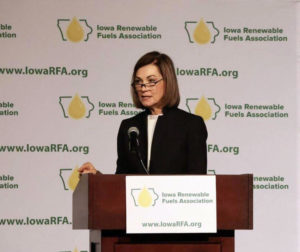In her explanation for vetoing the bill, Gov. Reynolds said the bill would set a troubling precedent.
“For example, the bill would block a major pipeline project that uses only voluntary easements,” wrote Reynolds. “Southwest Iowa Renewable Energy (SIRE) is in the final stages of connecting to a CO2 pipeline with not a single acre condemned. Yet new insurance mandates and an arbitrary 25-year limit that HF 639 places on CO2 pipelines would effectively kill the project-despite the millions that have already been spent on its development. There is no clear or logical basis for that time limit-and it would make it difficult for companies like SIRE to justify the additional investment.”
Gov. Reynolds continued, “Those who crafted the bill said they don’t want to stop CO2 pipelines that rely entirely on voluntary agreements. But that is exactly what the bill does. For that reason alone, I cannot sign it.”
The Iowa Renewable Fuels Association and Iowa Corn Growers Association were outspokenly opposed to the legislation along with trade unions, energy companies, the American Petroleum Institute, and landowners. IRFA Executive Director Monte Shaw thanked Gov. Reynolds for using her veto power. “This is a classic example of why our system of government has checks and balances. Any thoughtful review of this bill would determine that it would lead to higher energy prices for Iowans, hamper future economic development, hold back job creation, and stifle new markets for Iowa farmers.”


